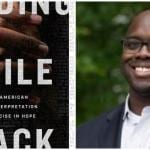Yes, Virginia, it’s our first Covid Christmas and there isn’t a Santa Claus.
Having passed the lap of holiday season 2020, December’s dates loom large on our pandemic horizon. The CDC said don’t travel . Macy’s shrank its annual parade last week and won’t be staging Santa visits in its stores for the first time in 159 years. It’s a terrible idea anyway, children crowding in line to sit on the knee of an older man who may have underlying conditions, to whisper right in his face before another kid, and another, and another come up to do the same. None of that now. Substitutes have been suggested. For kids, Santa behind plexiglass or old fashioned letters mailed to the North Pole. For adults, Zoom reunions, Zoom cocktails, Zoom caroling. But if we have to make do with this, it hardly seems worth the effort. 
If we can only do the holidays this reduced way–and, given due concern for the health of others and the common good, it does seem like this is the only way–let’s just not do it. If all we can do is the pandemic-substitute holiday, as Flannery O’Connor famously said of eucharist-as-symbol, I say to hell with it.
Rejecting Christmas done wrongly has distinguished historical pedigree. In 1621 Plymouth Governor William Bradford harassed workers he found playing in the streets on December 25. When he urged them to their labors, they protested that it was contrary to conscience to work on Christmas day. When he later found them still at sport, he banished merriment and sent them packing, on grounds that they could practice devotion at home if their consciences called them but it crossed his conscience that they should play while others work.
C.S. Lewis, blasting 1950s commercialized Christmas, affected the voice of a latter day Herodotus to mock “Exmas in Niatirb” (Britain in reverse). Exmas required the many to buy gifts, “all kinds of trumpery, useless and ridiculous” and eat too much, leaving them the next day “internally disordered by the supper and the drinking and reckoning how much they have spent on gifts and on the wine.” He claimed Exmas revelers had nothing whatever in common with the few who “keep Crissmas, doing the opposite to the majority of the Niatirbians, rise early on that day with shining faces and go before sunrise to certain temples where they partake of a sacred feast” involving worship of a baby.
Contra Bradford, I say Christmas deserves revelry. Abundant food, drink, music, and play belong to a feast whose point is the word made flesh, God blessing creation wonderfully made and even more wonderfully redeemed. The caroling, the prized gifts, the comes-but-once-a-year cookies, the feasting, the fatness, the lights inside and out, are all right in a holiday whose point is the Incarnation. All that amplitude embraces a lot of hangers-on and people of goodwill who don’t necessarily confirm the identity of the babe in lying in the manger. Contra Lewis, Exmas and Crissmas revelers can be sharing the same holiday. But Bradford is right to insist that celebration of Christmas had better be about Christmas.
People who rue the commercialization of Christmas have been handed the gift they have requested for years. Instead of taking it gladly, some seem to be doing the opposite. Denied home-for-the-holidays and full-church-choir, some look to the marketplace for compensation, trying to save Christmas by making it more commercial, putting up lights early and buying online because it’s so easy, because you need a little Christmas right this very minute.
Unsurprisingly, my reaction is opposite to what people around me seem to prefer. Covid appears to be driving others to make not less of Christmas but more. Perhaps because there is little else to do or because outdoor decorations are a safe way to spread cheer, my neighbors hauled out the holly much earlier this year.
It’s not just my neighbors. Things have been strange since the day before Halloween when I tried to buy candy. I hadn’t believed Halloween was going to happen but as a hedge wanted a bag or two. The store was pretty much cleaned out, other people having bought up the candy as triumph of hope over Covid experience. A few remaining witchy things were relegated to an endcap. Pride of place now belonged to Christmas decorations. In late October, Reese’s pumpkins were nowhere to be found but there were plenty of peanut-butter trees. Harvest-y goods got skipped over altogether (why I was surprised to see people aflurry for Thanksgiving, because the lack of merchandise made me think we already had agreed to cancel that). Thanksgiving wasn’t quite canceled, but the CDC warns that the hour is late, the days are dark, that we celebrate best by staying home, loving our loved ones by staying far away.
You don’t need to prepare for Christmas before Halloween. Even starting Christmas after Thanksgiving is too early for me, though I do like passing a post-Thanksgiving road trip by counting cars with trees lashed on top. Until about a decade ago, no one used to ask in early December, right answer clearly implied, “Are you ready?” Christmas already has its own period of preparation built in. It’s called Advent. Advent accomplishes something different from Christmas, trains attention on first and last things: people get ready, level the mountains and fill the valleys, let all mortal flesh keep silence. Advent leaves plenty of time to prepare. Advent is not last-minute for Christmas preparation.
Christmas lovers, arise! You may still wonder, with Charlie Brown, what Christmas is all about, though for the first time ever, you have to subscribe to Disney+ to hear Linus tell the true meaning of Christmas (Disney, noticing the irony, conceded access to PBS for a few days). If pandemic prevents celebration of Christmas the way it ought to be celebrated, but also allows us to skip a lot of stuff never truly belonging to Christmas, make the best of it. Refuse this year’s cheap substitutes. Covid has forced a hard reset. Don’t waste it.
If we can’t do up Christmas right this year, we have the most polite of all possible excuses–an abundance of caution, trying to safeguard your health and mine–not to do all the other stuff. For once in our lives, we have been granted permission to not do it. We don’t have to find pandemic-safe ways to do all the same things. Denatured beyond recognition by reasonable public-health rules, usual holiday expectations hold no sway. We don’t have to find a way hygienically to visit Santa. We can skip Black Friday, Cyber Monday, gifts for the person who has everything, elves on shelves, secret santas, cookie exchanges, awkward office parties, awkward extended-family gatherings, obligatory side dishes. Some of these things are good, in right time, manner, and place. But we can let them go without real harm to real Christmas.
If you want Christmas, celebrate Christmas. You can do it all by yourself, or with your immediate family, or in your pod. Just the Incarnation, all by itself, is sufficient to keep cup running over for twelve days. But if rejoicing over God-with-us, a savior born this day in the city of David lying in a manger, is not your thing, then just skip it this year. Let it go. You’re not missing anything. You don’t need seven-foot inflatable snowmen in your yard this December. Which, just saying, look pretty uninspiring most of the time anyway, during the day while they lie flaccid in the grass.
If Christmas has been spoiled with too much spending and spangle, this year opens a way to lay that low. Prune off the accretions, reclaim the primitive beauty of the feast. Here I stand.













